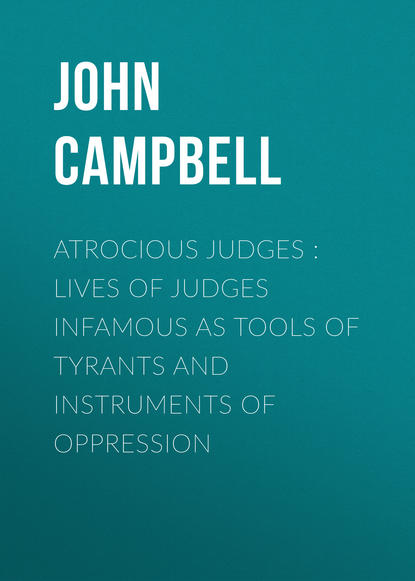По всем вопросам обращайтесь на: info@litportal.ru
(©) 2003-2024.
✖
Atrocious Judges : Lives of Judges Infamous as Tools of Tyrants and Instruments of Oppression
Настройки чтения
Размер шрифта
Высота строк
Поля
46
Noy had begun, like Brampston, a flaming patriot, but, like him and so many other lawyers, had been bought over to the side of power by the hope of promotion, and being made attorney general, had advised the issue of the writs for ship money. —Ed.
47
Cro. Car. 403. These forms are no longer used. The chief justice is now sworn in privately before the chancellor; and without any speechifying he enters the court and takes his place on the bench with the other judges. But in Scotland they still subject the new judge to trials of his sufficiency; while these are going on he is called lord probationer; and he might undoubtedly be plucked if the court should think fit.
48
This is exactly the sort of judges from whom we in America have so much to fear. —Ed.
49
We have seen in America similar attempts to stop counsel from exposing the unsoundness of judicial opinions given in support of the fugitive slave act. —Ed.
50
This is the very doctrine lately revived, in a little different shape, by some of our American divines – that whatsoever the legislative power in its conscience thinks it may require, we ought to yield. —Ed.
51
Some of our American federal judges are in the habit of declaiming much in the same style against abolitionists – who, indeed, may be considered as occupying a position in our present affairs in many respects parallel to that of the English Puritans in the times of Charles I. —Ed.
52
Having once refused to hear counsel against ship money, he now undertook to square the account by refusing to hear counsel for it. —Ed.
53
See life of Hyde, ante, p. 97.
54
This supposed inability of the king to do wrong has in America among a certain class been transferred to the federal government, which represents the royal authority of the English. —Ed.
55
2 Bl. Com. 69. Compulsory knighthood was abolished by the Long Parliament, 16 Car. I. c. 20.
56
Their decisions are still of as much authority on legal questions as those of courts sitting under a commission from the crown; and they were published with the sanction of the chancellor and all the judges in the reigns of Charles II. and James II.
57
It is doubtless a like mixture of motives that prompts just now the conduct of some of our American lawyers. —Ed.
58
Charles II., in his Declaration from Breda, had promised that he should “proceed only against the immediate murderers of his royal father.”
59
In answer to the address of the two Houses of the Convention Parliament to spare the lives of Vane and Lambert, the lord chancellor reported, “His majesty grants the desire of the said petition;” – the ancient form of passing acts of Parliament. The ultra Cavalier House of Commons which followed desired Vane’s death, but could not alter the law or abrogate the royal promise.
60
In his younger days, before the civil war, Sir Henry Vane had been among the early emigrants to Massachusetts, and as governor of that colony had borne a part in some remarkable transactions there. – See Hildreth’s History of the United States, vol. i. ch. ix.
61
A fortress on the south shore of the English Channel, taken by Cromwell from the Spaniards, and by Charles II. sold at this time to Louis XIV. of France.
62
So Bacon, better at precept than at practice, in his advice to Sir George Villars, requires in judges these three attributes – they must be men of courage, fearing God, and hating covetousness: an ignorant man cannot, a coward dare not be a good judge. On the American bench we have too many cowards. —Ed.
63
The following dialogue occurred after the verdict: —
Prisoner.– I most humbly beseech your lordship to remember my condition, (he had before stated himself to be the father of nine small children,) and intercede for me.
Lord Hyde.– I would not intercede for my own father in this case, if he were alive.
64
This practice of putting questions to the prisoner intended to intimidate him, to involve him in contradictions, or to elicit from him some indiscreet admission, had ceased during the Commonwealth, but was revived by the new royal judges.
65
This was the same doctrine afterwards attempted to be maintained by Lord Mansfield, but overruled by a declaratory act of Parliament.
66
An American specimen of this style of judicial decision may be found in Judge Grier’s way of speaking on the bench about Abolitionists. —Ed.
67
6 State Trials, 701-709.
68
2 Hale, P. C. 158.
69
The above passage enclosed in brackets has been added by the editor. Our American judges, more subtle than their predecessors, instead of fining juries for not rendering verdicts according to directions, have introduced the practice of questioning jurors beforehand, and not allowing them to sit unless they pass a satisfactory examination. —Ed.





